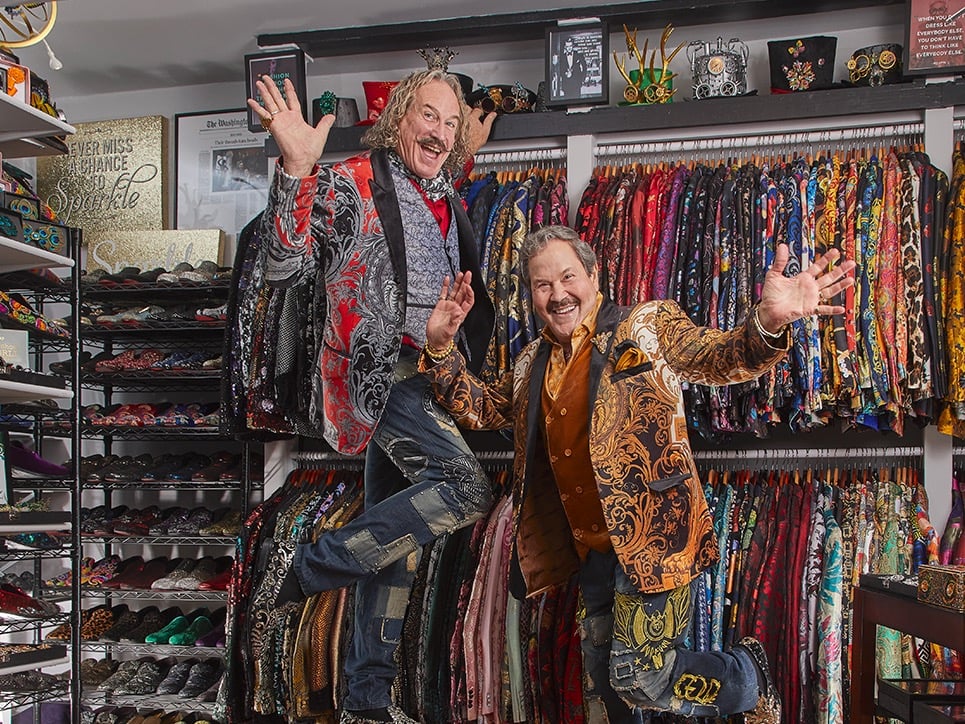It's time for leg lifts, which does not make Miriam Benbassat smile. "Slow," says her trainer, Colin Shah. "Flex your foot. Okay, 20 more."
"20?"
"Yeah."
"That's mean."
Still, Benbassat is doing okay as she lays down on a leg-lift machine to work on her once-underused, still-plump quadriceps. The 66-year-old comes to Definitions Personal Training Plus in Georgetown three times a week, today in a black van Gogh T-shirt–a gift from Shah–and black warm-up pants.
After five years together, Shah and Benbassat, a former assistant scientific counselor at the Embassy of Israel, have become friends: She threw him an engagement party and has turned him on to classical music. He saves New York Times crossword puzzles for her and has pushed her to the point where–unlike a few years ago–she can ride a stationary bike for 15 minutes.
"Miriam bought me box seats to the symphony for my birthday," says Shah, 28. "I was blown away."
"We take care of each other," Benbassat says.
In a city that rewards an aura of power, the gym is an area where the control-obsessed willingly cede authority.
According to pros in the fitness industry, more people–mostly in their forties, fifties, and sixties–are signing on with personal trainers, and what they often end up with is a blend of drill sergeant, life coach, pal, and confidant.
Clients typically aren't trying to attain the camera-ready abs of Britney Spears. They just want to stay in shape for tennis or skiing, maybe keep their blood pressure down and their waistlines within the confines of their favorite pants.
"The field has hit a sweet spot," says Raymond Simmons, past president of the American Association of Personal Trainers. He thinks much of the reason for the surge has to do with the still-active-but-aging baby-boomer generation. "They don't want to look like their parents, and they have discretionary income."
It's a service that's no longer perceived as a movie-star indulgence, Simmons says. Unlike a generation ago, exercise is understood to be part of a healthy life. "In my mother's time, I don't think that she once thought about going to the gym."
So if you can afford your own personal motivator–Shah charges $80 an hour at the gym, $125 for a home visit–more people are saying okay.
Blane Sopher, a stylist at Christiane Salon in Georgetown, is heavily tattooed with butterflies and flowers. He says he's been seeing Shah three times a week for the past three years. When they first met, he says, "I was dumpy, 25 pounds overweight." Now, at 38, Sopher's the same weight but with nice muscles. "It's made my tattoos more three-dimensional," he says. Sure, he could have done it without Shah's help–in theory. But "he's my reason for getting up and going to the gym."
When you hire a trainer, you're essentially paying for a workout buddy who–if he or she is good–not only knows a lot about fitness but is totally focused on you, says trainer Margo Carper, who charges $85 an hour.
She's been working out with Washington Post exec Ben Bradlee and his wife, Sally Quinn, for years, and she's trained Madeleine Albright since the former Secretary of State left the Clinton administration.
Albright says she used to find any excuse to avoid exercise–like not wanting to mess up her hair. She says, "Now I find excuses to work out. I love the way it makes me feel, especially knowing that I can leg-press 380 pounds!"
In some cases, the job of personal trainer goes beyond counting leg lifts or devising a workout plan.
Yaz Boyum, a trainer for 14 years and a blond bodybuilder, works out with a 60-year-old man who's lost about 50 pounds in two years, in part because the high-energy Boyum is on his case.
"I call him every morning, a 30-second phone call. I say 'Good morning, Justin; how are you feeling? What did you have for breakfast? Remember, no bread today. Drink your water. You've got five pounds to lose, you can do it.' "
The client is Justin Frank, a psychiatrist who asked Boyum to make these calls. "I will not exercise on my own," he admits.
Trainers aren't all so reliable, educated, or involved; sometimes they're downright scary, other times just annoying.
Rockville attorney Jay Eisenberg, 38, says he went through several bad trainers before coming to Jason Hadeed of Elite Athlete Training Systems. "It was a joke and very expensive," Eisenberg says. "They'd be looking around the gym, and some came to sessions late and talked on their cell phones. I'm not looking for someone to hold a clipboard; I'm looking for someone to inspire me."
Eisenberg has a friend whose trainer pushed him so hard on the leg press, he pulled a muscle, sidelining him for a year.
Clients aren't all angels, either. Like the woman who asked Hadeed to turn down the air conditioning, already at 65 degrees, because she didn't want to sweat. Or the one who regally held out her water bottle for him to refill. Hadeed says, "I took it and threw it across the room. I said, 'You get it yourself; you're here for exercise.' I'm not her butler."
Sexual attraction can be a complicating factor. Trainers are physically fit and often good-looking and friendly. Scouts from NBC once stalked Shah through a Barnes & Noble, hoping he'd star in a Joe Millionaire-type show.
"Sometimes the boyfriend starts hanging around more during the sessions," says trainer Roger Yasin, 29. "And I've been hit on, but if you step over that line you might lose a client or a friend."
Ask Jason Hadeed whether he's heard of hanky-panky between trainers and trainees and he laughs. "Oh my God, yes! I could go to one gym and point to a handful of trainers who I know are sleeping with various clients. I've had clients ask me out on dates. I say, 'I don't do that.' It's an absolute no-no."
Clients who find themselves with a new burst of energy or firmer thighs often pay their trainers back very well. Carper used to work with Donna Shalala when she was Secretary of Health and Human Services. In honor of Carper's birthday, Shalala invited a group of the trainer's clients to the Kennedy Center to hear the National Symphony Orchestra and arranged for them to sit in the President's Box. "I was just overwhelmed," Carper says. "It was mindblowingly thoughtful and kind."
David Keller, the well-coifed and tanned owner of Fitness for Life Georgetown, received a Mercedes from one client. It was her father's, he says, and soon after the father's death Keller offered to buy it. "She looked at me with horror, and said, 'We will never sell that car. My father loved that car more than he loved me.' A couple months later, she said, 'I want you to have the car.' "
Shah was Katharine Graham's trainer. He remembers hobbling up to the Graham mansion, back when he was on crutches after a car accident in 1999. "One day she was like, 'Why don't you have a car?' I told her I couldn't really afford it right now, and she said, 'Do you want me to buy you one?' " Though appreciative, he declined.
Shah, who started in the business at Washington Sports Club and then worked with Keller at Fitness for Life, has official trainer certification. Like Carper and other highly involved trainers, he often accompanies clients on visits to doctors–when there's persistent back or knee pain, for example. He's as well read as many of his trainees, though he admits to feeling self-conscious about lacking a college degree. In response, one client bought him a stack of classics along with a bunch of prestamped postcards for him to submit mini book reports to her as he completed each one. He did. It also doesn't hurt his rapport with high society that he's married to a concert viola player.
Three-quarters of the guests who came to his June wedding celebration in Maine were clients, including former White House chief counsel C. Boyden Gray. Shah says these relationships don't blossom overnight: "The first two years I trained Boyden, I don't think he knew my name." Now, after three sessions a week for six years, Shah says, "he's wonderful, so freakin' funny, like we tell jokes and laugh, and then you see him on television and he's so serious." Gray calls the trainer "a great friend."
The daughter of a client was the flower girl in Shah's wedding, while Blane Sopher did the bridal party's hair. Mrs. Graham's former personal assistant and speechwriter cohosted an engagement party for Colin and his now-wife, Kirsten.
Benbassat introduced him to Kirsten in the first place. "I feel like he's a part of our family," Benbassat says. He trains her husband, Eli, too.
Shah once gave a eulogy at the funeral of a former client, one who used to bring Shah with her family to their vacation house in the Adirondacks.
David Keller says such closeness is inevitable after enough time spent together: "One client said that I am the most personal relationship in her life, because I see her five days a week, and I have for ten years."
But when the business relationship ventures into friend territory, he says, he needs to switch from trainer to social mode. "When they invite me to the opera or the symphony or to a ball, it's interesting, because they have to learn who David Keller is when I don't have my exercise hat on."
Michele Diseati, a trainer in Chevy Chase, says she's gone to the grocery store with people she trains and told them, "This is what I want you to look at on the label." She sometimes joins them for dinner or on vacations to Florida or Martha's Vineyard. "It's a very wacky business because you're their friend, yet they pay you."
DC trainer Ron Gage says he isn't comfortable taking his professional relationships to a more friendly level. For one thing, he says, "If they blow off a session, you can't charge them without causing hard feelings. I'm trying to run my business."
Fact is, most of us aren't looking for a soul mate, not at these rates. "It can be scary for people if they want to work with a trainer to think, 'Oh my God, this person is going to expect me to be their best buddy,' " says Keller, who charges $95 to $125 an hour. "I have some clients where I have no personal relationship with them, all they want is to work out. A lot of us don't have much energy left over after a hard day at the office and demanding families. The last thing you want is a demanding relationship with your trainer."
Carper says she doesn't socialize with clients like Sally Quinn and Ben Bradlee. Her time with Bradlee is centered on his ability to lift serious poundage on lateral leg pull-downs during their twice-weekly workouts at the Four Seasons. Their sessions are "extremely pleasant and fun," Bradlee reports; "we talk about serious stuff and other junk." But even better: "She makes me exercise. I'm pooped at the end."
Trainers We Like
Yaz Boyum, 202-424-1050; yazinc.com. A competitive bodybuilder, with muscular photos on her Web site to prove it, she knows how to motivate clients. Trains at Definitions in Georgetown and in homes. Certified by NSCA and NSPA. $90 to $200 an hour.
Margo Carper, 202-329-5569; car-permst@aol.com. A trainer who's also a massage therapist, she makes some important people sweat. Works at Definitions gym in Georgetown and the Four Seasons. Certified by NASM. $85 a session.
Michele Diseati, 301-943-2739. She has degrees in kinesiology and neuromuscular therapy, and specializes in physical therapy–doctors often refer injured clients to her. Trains in homes or at her Chevy Chase office; $75 to $150 an hour.
Ron Gage, 202-210-1574; rgage@engagefitness.com. Not only a pro but a nice guy. Charges $60 to $110 a session, depending on travel and number of sessions.
Jason Hadeed, 301-972-0558; www.eliteAthleteTraining.com. Co-owner of Elite Athlete Training Systems in Rockville, whose trainers are certified by NSCA, NSPA, and ACE. Hadeed and the 15 other EATS trainers–we've heard good things, too, about Alan Stein and Kenny Andrade–charge $50 to $65 a session. Their specialty is athletes, though Hadeed says they work with "moms and dads" too.
JP Montalvan, 301-986-9473; fitnesswise.net. Director of FitnessWise in Bethesda, which uses a team approach–several trainers help devise a client's exercise plan. They work well with injuries and chronic conditions. Montalvan is certified by NSCA and ACE and charges $58 to $100 an hour.
One-to-One Fitness Centers, McLean (703-848-0881), Reston (703-709-6100) and in DC on K Street (202-452-1861) and 13th Street (202-383-8765); www.1to1fitness.com. Clients are assigned a "training coordinator" to oversee their overall fitness program and to different trainers for different sessions. Trainers are required to have a college degree in exercise science or a related field and to be certified by NASM, NSCA, or ACSM. $199 initiation fee plus $42 to $49 for a 45-minute session.
Jonathan Ross, 301-367-6843 (cell), 301-262-4553 (Sport Fit); sportfitclubs.com. Ross is certified by ACE and NSCA and was named "personal training director of the year" by Personal Fitness Professional magazine. To train with him at Sport Fit Bowie Racquet, it's $75 an hour for members, $85 for nonmembers. Charges $100 to $120 for home sessions.
Colin Shah, 202-421-4175; colinshah@mac.com. He's very friendly–he calls himself a "cheerleader"–and trusted by a long list of prominent Washingtonians. Charges $80 an hour at Definitions in Georgetown, $100 to $125 for in-home training.
STS Health & Fitness, McLean; 703-442-0748; www.stsfit.com. STS–which counts Queen Noor as a client–offers private rooms for workouts and trainers who have certifications from ACSM, NSCA, or ACE. The quiet atmosphere makes it far from your typical gym. $55 to $65 an hour.
Roger Yasin, 703-200-3600; Roger@ryfitness.com. A young trainer with a degree in exercise physiology, Yasin often works with people undergoing rehabilitation and is praised for his "boundless energy." Works in homes and businesses; $90 an hour at businesses, $110 in homes.
Finding a Well-Trained Trainer
Which Credentials Mean Something, and Signs That Someone Could Hurt You
If you're going to put your body in someone else's hands and pay as much as $125 an hour, you want a certified pro. First you've got to figure out what "certified" means. Sometimes not much.
Certifications That Matter
"It's one of the challenges of being in an industry that's unregulated," says Jonathan Ross, personal-training director at Sport Fit Bowie Racquet. There are more than 400 certifying bodies, including "sites on the Internet where you can take a test and get a certification whether you pass or not."
There are about ten organizations whose certifications have some weight. Experts point to NSCA (National Strength & Conditioning Association), ACSM (American College of Sports Medicine), and NASM (National Academy of Sports Medicine) as the most respected. There's also the Maryland-based NSPA (National Strength Professionals Association), which certifies trainers after a two-day course and a written and practical exam. That's more than most certifying programs offer.
Flexing Their Muscle
Stuart Smith, who runs BodySmith personal-training gyms in Dupont and Logan circles, says he looks for trainers who have a degree in kinesiology or exercise science and who are able to reel off ten exercises for the chest, for example.
People skills count. A person may have half a dozen certifications, but "if the trainer's not intuitive, if they're looking at themselves in the mirror, you don't want that," says trainer Ron Gage, a 42-year-old former gymnast with a loyal following.
Sweating the Details
Gage suggests that regardless of your goal–whether it's bodybuilding or climbing stairs without strain–anyone looking for a trainer should observe him or her in action with a client.
An initial interview is important. Before you get to the heavy-breathing part, a good trainer should ask about your medical history and what you want to achieve. It's a bad sign if a trainer coaxes you onto the elliptical machine in the first five minutes of your meeting, as one trainer did with me.
Therese McNerney, a physical therapist who started a gym called Precision Health & Fitness in Bethesda, has an $8,000 computer that helps her conduct a full health assessment. "Somebody recently came in with a neck problem. The previous trainer had them doing a lot of things where they were pushing weights up over their head, and it exacerbated the problem," she says.
Jason Hadeed and the other trainers who work for him at Rockville's Elite Athlete Training Systems give new clients the PAR-Q, the Physical Activity Readiness Questionnaire. This form from ACSM includes questions like "Do you feel pain in your chest when you do physical activity?" and asks about medications and bone or joint problems. If there are serious issues, Hadeed faxes the client's doctor for more information.
Red Flags
Beware of a trainer who tries to sell you supplements, McNerney says. "People have no business doing that" if they're not dietitians.
More danger signs: the trainer who's talking on his cell phone or eating while you're lifting weights; the trainer who tries to play doctor/chiropractor (cracking a client's back, for example).
Hadeed's pet peeve is the trainer who gets comfortable in a chair while a client is doing reps on a machine across the room. "What if something happens to the person while you're sitting there drinking your cappuccino?" he asks.
Ask about cancellation policies. Some charge the full fee if you don't give 24 hours' notice.
Note the fine print in the contract, if you're asked to sign one. Gold's Gym requires written notice at least 20 days before you want to end training.
Assessing Your Goals
Rates for personal training in Washington range from $45 to more than $100 an hour. Despite the cost, some clients are in it for life. For others, an eight-week plan is enough to learn the basics and get muscles and motivation in gear. A trainer should be willing to work toward your goal, even if that goal is to not need him after three months.
If you're looking for a trainer within your gym, talk to the fitness manager about your goals and needs. He should do his best to find a match. Some of the best trainers aren't affiliated with a gym and tend to grow their business through word of mouth. See the list of trainers we like (this page), and ask around for referrals. There's no better advertisement than an endorphin-charged customer who's lost his love handles.
Like Michael McDavitt, a 40-year-old film producer who recommends his trainer, Roger Yasin, to anyone who'll listen–including his mother.
"Roger has such a passion for what he does, he gives you his undivided attention, and he tries to push you to your limits," McDavitt says, citing the three main characteristics that seem to make loyal clients. "He's changed my life, he really has."
For more information and to help find certified trainers in the area, try these:
National Strength & Conditioning Association, www.nsca-lift.org
National Academy of Sports Medicine, www.nasm.org
American College of Sports Medicine, www.acsm.org
IDEA, www.ideafit.com.
One-Stop Fitness
Fitness for Life Georgetown bills itself as an "exclusive center for physical well-being." Housed in two adjacent townhouses in Georgetown, the gym/spa/clinic offers a therapeutic smorgasbord beyond personal training and physical therapy. On the third floor is a light and airy massage room, located above a small yoga studio and overlooking the backyard's heated exercise-therapy pool.
Says owner David Keller, a gentle six-foot-seven presence, "We want to be a boutique resource for the neighborhood, like the corner drugstore" for the "crème de la crème of clients." Keller's clients have included Tipper Gore and Bob Woodward.
If you've got the money–$95 a session–they've got the well-being, or different ways to help you find it. Patti Cumming, a public-relations manager at Neiman Marcus, who comes for massages, personal training, and yoga, says, "It's very different, all about peace and quiet. Sometimes you're the only person there."
Fitness for Life has a new, probably inevitable service–psychotherapy. Psychotherapist Ann Brown, a former client, came on board January 1. Keller, who promotes physical fitness with a do-or-decay pitch, explains that the mind needs attending to as well as the body. "It's the big picture of health. You're not going to want to take care of yourself if you don't like yourself."
For more information, call 202-338-6765 or see www.fitnessforlifegeorgetown.com.

















